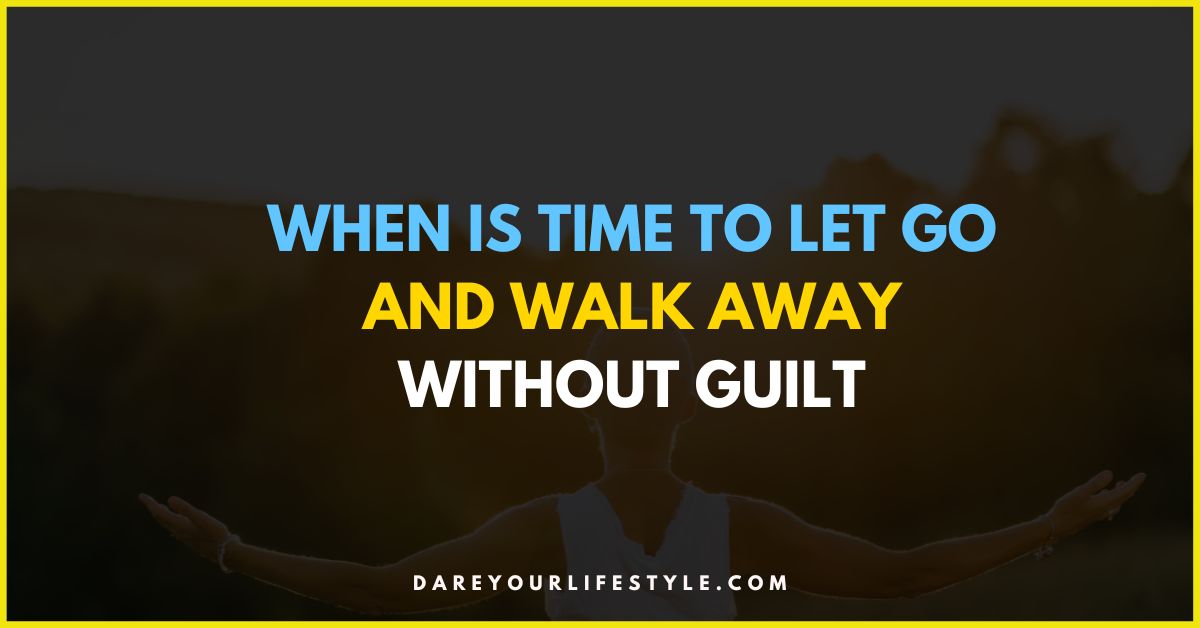Disclaimer: This post may contain affiliate links, meaning we get a small commission if you make a purchase through our link at no extra cost to you. For more information, please visit our Disclaimer Page.
Have you ever felt like you’re carrying a heavy backpack, filled with things you no longer need, but just can’t seem to put down? Maybe it’s a friendship that drains you, a job that crushes your spirit, or even a dream you once cherished but has now lost its sparkle. We’ve all been there. We hold on—sometimes for years—out of a sense of loyalty, obligation, fear, or simply because it’s what we’ve always known.
But what if letting go isn’t about giving up, but about making space for something better? It’s about choosing yourself, your peace, and your future.
Table of Contents
Key Takeaways
- Recognize the Signs: Learn to identify signals like persistent unhappiness, draining energy, and lack of growth.
- Confront the Guilt: Understand that guilt often stems from fear of the unknown, loyalty, or societal expectations, and that choosing your well-being is not selfish.
- Empower Yourself with Practical Steps: Discover actionable strategies, from acknowledging your feelings and setting boundaries to creating a plan and seeking support, to walk away confidently.
- Embrace New Beginnings: Realize that letting go creates vital space for new opportunities, personal growth, and a more authentic, joyful life.
- Prioritize Your Peace: Your mental, emotional, and spiritual well-being are paramount; making choices that honor these is a courageous act of self-love.

When Is Time to Let Go
Let’s start by digging into what letting go means. It’s not about being careless or abandoning responsibilities.
Instead, it’s a powerful act of self-preservation and growth.
Think of it like decluttering your home. You wouldn’t keep broken furniture, clothes that don’t fit, or dusty boxes filled with junk just because you once owned them. You’d clear them out to make space for things that bring you joy, comfort, and utility.
The same principle applies to our lives. Letting go means consciously deciding to release attachments to people, situations, beliefs, or even past versions of ourselves that no longer serve our highest good.
It’s about accepting that some chapters need to close for new ones to begin.
Sometimes, the most loving thing you can do for yourself—and even for others—is to create space for something different1.
Why Holding On Hurts
Holding on to things that no longer work for us is like trying to row a boat with a broken oar. It’s exhausting, frustrating, and you’re not getting anywhere.
When we cling to situations, relationships, or beliefs that are past their expiration date, we create a constant state of internal conflict.
This conflict can manifest in many ways:
- Emotional Exhaustion: You feel constantly drained, sad, anxious, or angry. It’s like your emotional battery is always running on empty.
- Physical Symptoms: Stress can show up as headaches, stomach issues, sleep problems, or even a weakened immune system. Our bodies often tell us what our minds try to ignore.
- Stagnation: You feel stuck, unable to move forward, grow, or experience new things. It’s like being in quicksand—the more you struggle, the deeper you sink.
- Missed Opportunities: When your hands are full holding onto old things, you can’t grab onto new, exciting opportunities that come your way. You’re too busy looking backward instead of forward.
“Letting go isn’t a sign of weakness; it’s a testament to your strength and courage to prioritize your peace and well-being.”1
The Illusion of Control When letting go
Often, we hold on because we believe we can control the outcome, or that if we just try harder, things will change. We might think, “If I just explain myself one more time, they’ll understand,” or “If I put in more hours, my boss will finally appreciate me.”
But the truth is, we can only control our own actions and reactions, not those of others or the unfolding of life’s events.
This illusion of control can be incredibly damaging. It keeps us trapped in cycles of disappointment and frustration.
Letting go means surrendering the need to control what is beyond your influence. It’s about trusting that if something isn’t working, it’s okay to release it and allow space for something that does1.
“Sometimes, the kindest thing you can do for yourself is to stop fighting a battle that isn’t yours to win, or one that has already been lost.”
When Is Time to Let Go: Signs It’s Time to Release What No Longer Serves You
Our lives are constantly changing, and what served us yesterday might not serve us today. Recognizing the signs that it’s time to let go is the first crucial step toward reclaiming your peace and happiness.
Here are some clear indicators:
Here are some clear indicators that it might be time to let go:
- Persistent Unhappiness or Dissatisfaction
- Lingering sadness or dissatisfaction, even when things seem “fine.”
- A knot in your stomach or a lack of joy in what once excited you.
- Constant feelings of being low, unfulfilled, or emotionally drained.
- Draining Energy and Feeling Depleted
- Chronic fatigue despite rest.
- Exhaustion at the mere thought of engaging with certain people or situations.
- You’re giving more than you’re receiving.
- Repeated Patterns and No Progress
- Stuck in the same cycles (arguments, disappointments, obstacles).
- No resolution despite effort and communication.
- Breaking free might require removing yourself entirely.
- Compromising Your Values or Well-being
- Being pushed to betray your core values (honesty, respect, integrity).
- Your mental, emotional, or physical health is at risk.
- Letting go becomes a necessity, not just an option.
- Feeling Stuck or Stagnant
- No growth, change, or excitement about the future.
- Life feels like a rut with no forward movement.
- Something might be anchoring you to the past.
- Lack of Growth or Personal Development
- You’re not learning, expanding, or being challenged in healthy ways.
- You feel smaller, diminished, or disconnected from your true self.
- Real growth often begins when you step away from what holds you back.
- Physical Symptoms of Stress
- Unexplained headaches, digestive issues, insomnia, or chronic pain.
- Frequent illness or a weakened immune system.
- Your body might be alerting you to the stress of holding on.
- Intuition Screaming at You
- That gut feeling or inner whisper that something isn’t right.
- You feel it deeply—even if your mind argues otherwise.
- Trust your intuition. You do know when it’s time to let go.
When Is Time to Let Go: Relationships That Drain You
Relationships are meant to enrich our lives, provide support, and foster connection. However, not all relationships are healthy, and some can become significant sources of stress, unhappiness, and emotional depletion. Recognizing when a relationship is no longer serving you is crucial for your well-being.
Friendships: One-Sided or Negative Influence 🎭
- One-Sided Dynamic:
- You’re always the one reaching out, checking in, and offering support.
- You give emotionally, but rarely receive the same in return.
- You feel emotionally drained after interactions.
- Negative Influence:
- You leave feeling worse—criticized, judged, or emotionally depleted.
- Constant exposure to gossip, complaining, or toxic behaviours.
- Instead of being uplifted, you feel diminished.
If a friendship brings more harm than joy, it may be time to walk away.
(Explore more in when to walk away from a friendship.)
Romantic Relationships: Disrespect, Abuse, or No Future 💔
- Lack of Respect:
- Your boundaries, opinions, and emotions are regularly ignored or belittled.
- You feel dismissed, mocked, or undervalued.
- Abuse (Emotional/Physical):
- Emotional abuse includes manipulation, gaslighting, isolation, or criticism.
- Physical, verbal, or sexual abuse is never acceptable.
- Abuse—subtle or overt—is always a valid reason to leave.
- Constant Conflict:
- The relationship feels like a battleground of unresolved arguments.
- Peace and harmony are rare or nonexistent.
- No Shared Future:
- Major life goals, values, or dreams are incompatible.
- You’ve tried to work it out, but keep arriving at a dead end.
If love comes at the cost of your peace or safety, it’s time to choose yourself.
(For more, read signs it’s time to leave a relationship.)
Family Dynamics: Toxic Patterns and Enabling 👨👩👧👦
- Toxic Patterns:
- Constant emotional pain, drama, criticism, or manipulation.
- Dysfunctional behaviors that never change, despite efforts.
- Enabling Harmful Behaviour:
- You constantly “rescue” or cover for a family member’s destructive habits.
- Support turns into self-sacrifice and emotional burnout.
Setting healthy boundaries with family is not betrayal—it’s protection.
(Read more in setting boundaries with family.)
Setting Boundaries as a Form of Letting Go
Sometimes, letting go in relationships isn’t about ending them, but about changing your role within them. This often involves setting clear, firm boundaries. Boundaries are essential for healthy relationships because they define what you will and will not accept.
By establishing boundaries, you are letting go of the expectation that others will automatically respect your needs and instead, you are taking control of defining those needs for yourself. It’s a powerful act of self-love and self-preservation.
| Type of Boundary | Description | Example of Letting Go |
|---|---|---|
| Physical | Your personal space and body | Letting go of physical touch you don’t want |
| Emotional | Your feelings and emotional energy | Letting go of being responsible for someone else’s emotions; refusing to engage in emotional manipulation |
| Time | How you spend your time | Letting go of over-committing; saying “no” to requests that drain you |
| Financial | Your money and possessions | Letting go of lending money you can’t afford to lose; setting limits on financial support |
| Mental/Intellectual | Your thoughts, beliefs, and opinions | Letting go of arguing with someone who refuses to listen; refusing to accept constant criticism |
Setting boundaries can feel uncomfortable at first, especially if you’re used to pleasing others. But it’s a vital step in honoring yourself and ensuring your relationships are healthy and reciprocal.
When Is Time to Let Go: Careers and Jobs That Stifle Your Soul
Your job should provide more than just a paycheck—it should contribute to your sense of purpose, well-being, and growth. If it’s draining you, it may be time to consider a change.
Lack of Passion or Purpose 🔥🚫
- You dread going to work every morning.
- Your tasks feel meaningless or uninspiring.
- There’s no excitement, motivation, or emotional connection to what you do.
- A job doesn’t need to be your calling, but it should at least spark some purpose.
If you feel numb or empty about your career, it may be time to explore a new path.
(See when to quit your job for deeper insight.)
No Growth or Challenge 🚧
- You feel stuck in the same role, year after year.
- Your work is repetitive, boring, and unchallenging.
- There’s no opportunity for skill development, learning, or promotion.
- This lack of growth can slowly chip away at your drive and creativity.
Toxic Work Environment ☣️
- Your workplace is filled with negativity, gossip, or bullying.
- You feel undervalued, ignored, or micromanaged.
- Unrealistic expectations lead to chronic stress or burnout.
- You’re sacrificing your health or happiness to stay employed.
If your work environment is harming your well-being, it’s time to reassess.
(Read how to quit your job gracefully for a smooth transition.)
Empower Yourself: Practical Steps to Let Go Without Guilt 🙌
Letting go doesn’t mean you’re giving up—it means you’re choosing you. Here’s how to do it with confidence:
- Acknowledge Your Feelings:
It’s okay to feel torn, sad, or uncertain. Your emotions are valid. - Set Clear Boundaries:
Decide what you’re no longer willing to tolerate—mentally, emotionally, or professionally. - Create a Plan:
Outline your next steps: updating your resume, job hunting, budgeting, or networking. - Seek Support:
Talk to trusted friends, mentors, or a career coach for guidance and encouragement. - Practice Self-Compassion:
Choosing peace, happiness, and personal growth is not selfish—it’s essential.
Embrace New Beginnings and Prioritize Your Peace
Letting go creates space for:
- New opportunities
- Personal growth
- A more authentic and joyful life
Your mental, emotional, and spiritual well-being are paramount. Choosing yourself is a courageous act of self-love.
If you’re struggling with guilt or need inspiration, about letting go and trusting in God and letting God and realizing your self-worth.
On a Final Note
When is time to let go usually doesn’t shout—it whispers in moments you brush off.
It’s in the way you second-guess yourself, how drained you feel, and how long you’ve been pretending things are fine.
Sometimes, we outgrow places, people, and versions of ourselves.
That’s not weakness—it’s growth you can’t fake.
You don’t have to wait for a breakdown to make a decision that gives you back your peace.
Even if it’s not easy, choosing to walk away can be the bravest thing you do.
It’s not about quitting.
It’s about realizing when something no longer adds to your life—and finally being okay with that.
Letting go doesn’t mean you stop caring, it means you start caring more about yourself.
You’re allowed to say “this isn’t working” and move forward without guilt.
In this article, we covered the truth behind when is time to let go, the real-life signs that show up, and the steps to take if you’re ready to stop holding on to what’s holding you back.
FAQ People Have About When It’s time to Let Go
How do I know if I’m holding on for the wrong reasons?
If your reasons are based on fear, guilt, obligation, or habit rather than genuine love, purpose, or joy, you’re probably holding on for the wrong reasons. Ask yourself: “If I let go, what am I afraid will happen?” If the answer is rooted in fear of being alone, disappointing others, or losing your identity, it’s time to reflect deeply.
What if letting go hurts someone else?
Letting go can be painful for everyone involved, but staying in a situation that’s unhealthy or unfulfilling helps no one in the long run. Remember, you’re not responsible for someone else’s happiness at the expense of your own well-being. Setting boundaries and communicating honestly is the most respectful path forward.
How can I let go without feeling guilty?
Guilt is a natural response, especially if you’re used to putting others first. To let go without guilt, focus on your reasons—your health, happiness, and growth. Remind yourself that you deserve peace and fulfillment.
Is it possible to let go and still care?
Absolutely. Letting go doesn’t mean you stop caring; it means you care enough about yourself to prioritize your well-being. You can wish someone well and still choose distance or a new direction. Compassion can coexist with boundaries.
What are the first steps to letting go?
Recognize the signs that it’s time.
Acknowledge your feelings honestly.
Seek support from trusted people or professionals.
Set clear boundaries.
Take small, consistent steps toward change.
Can letting go improve my mental health?
Yes! Letting go of toxic relationships, unfulfilling jobs, or unhealthy habits can dramatically boost your mental health. It reduces anxiety, increases self-esteem, and creates space for joy and growth. For more, see the importance of self-care.
How do I rebuild after letting go?
Yes! Letting go of toxic relationships, unfulfilling jobs, or unhealthy habits can dramatically boost your mental health. It reduces anxiety, increases self-esteem, and creates space for joy and growth. For more, see the importance of self-care.






